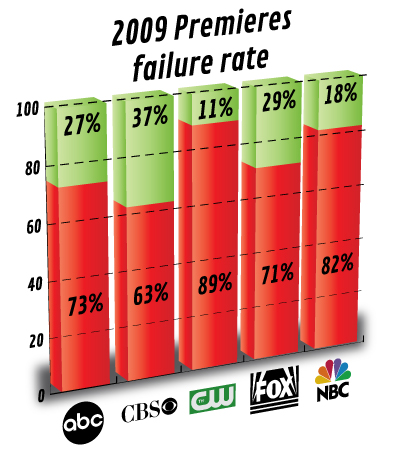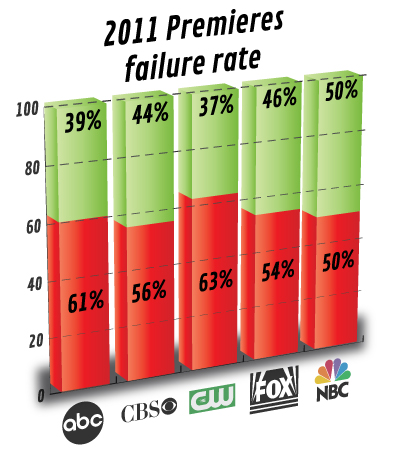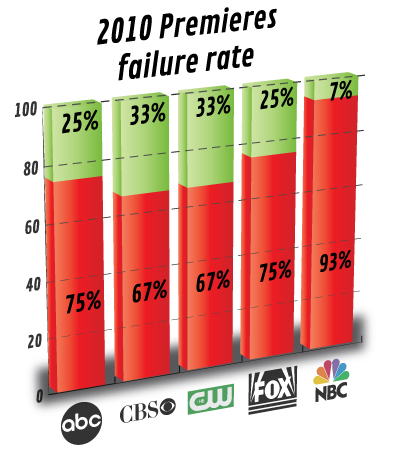How successful are new shows at surviving?

You know what job I’d never want to have? The guy or gal that has to decide which new pilots a network picks up.
A couple of weeks ago, I submitted my entry for the Annual Ted Marshall Open Television Death Pool. If you’ve never heard of it before, it’s a competition to see who can best predict the shows most likely to get cancelled in the upcoming television year. This is my first year participating, but I like my chances.
This time of year, as the new fall shows get ready to premiere, I often think back to a conversation that Brett and I had years ago. He’s long been the ratings guru at CliqueClack, and I’ve been trying to pick up some pointers from him for quite some time. In this particular case, we were wondering how the hell it is that TV executive keep their jobs. Most times, when fans make this particular statement, it is because someone somewhere had cancelled their beloved – yet underperforming – show. But Brett and I were looking at something different: how often new shows fail to see a second season.
I don’t know about you, but if I were successful at my job around 58% of the time, I’m not sure my boss would keep me around. But that is about how successful the combined broadcast networks were successful at having shows survive past their first year in 2011. When you look at two and three-year success rates, the numbers are much worse.
Let’s take a look at last season:
Of the three seasons that we’ll look at, 2011, should have the best numbers; the shows that premiered last year have only had to survive one summer to still be on the air. 42% of the shows that premiered last year are still on the air sometime this season (That’s 37 of 64). The CW looks to have performed the worst, and they benefit from not having yet made a decision — at least that I can find — about The Breaking Point yet; other than that, we’re only talking about two shows, Hart of Dixie and The LA Complex. NBC batted .500, with a fair mix of sitcoms (Whitney, Up All Night), non-scripted (Betty White’s Off Their Rockers, Rock Center with Brian Williams) and dramas (Smash, Grimm). They did have several high profile misses, though (The Playboy Club, The Firm, Awake, Are you there, Chelsea?). The Alphabet Network also had a particularly bad year with big projects, with Charlie’s Angels, Pan Am, The River and GCB not making the cut, but also saw big successes in Revenge, Scandal and Once Upon a Time.
After two years, the networks’ combined score is only 22%; that’s 36 of 46 shows no longer on the air today. ABC only has three shows it premiered in 2010 airing still (Happy Endings, Body of Proof, Extreme Makeover: Weight Loss Edition); the other nine shows it premiered didn’t live past their first seasons. Despite what you might have heard, FOX’s Bob’s Burgers is still around, but it joins only Raising Hope as the survivors from the Class of 2010. NBC, however, easily had the worst year picking shows. That 7% represents one show, The Voice. Sure, that show’s done well enough for the network to give two cycles in a season a shot starting this spring, but that’s it. Shows like Law & Order: LA, Outlaw, The Cape, the Event and Undercovers all struggled and didn’t see a second season.

Of the three seasons we are looking at, 2009 will obviously have it the hardest to still have shows still airing, but that year manages to have done better overall than last year; 24% of those shows are still around (12 of 58). 33% of 2009 shows saw a second season (17) and 28% saw a third (14). For the purposes of these statistics, I counted ABC’s Cougar Town as cancelled, as the network did drop the show — even though it was picked up by TBS. Considering the summer start, I doubt ABC executives would have thought Rookie Blue would be the only surviving drama, leaving shows like V, FlashForward and Eastwick behind. Parenthood and Community are the only remaining NBC shows, though both have been on the bubble for several seasons. Only one of The CW’s nine shows remains — The Vampire Diaries – while Life Unexpected did stick around for a second season.
What can we learn from these numbers? I think it actually speaks to how fickle of an audience we are than true “failure” on behalf of these executives. I don’t envy their job; their successes and failures are very public, and they are dealing with millions of dollars. Moreover, we’ve seen networks like NBC stick with shows like Community when their ratings don’t necessarily support it; I’d argue that you don’t see enough of that anymore, but the fact that some networks are willing to take chances on behalf of a devoted fan-base is pretty cool.
Of course, I’d rather there wasn’t a metric crapton of non-scripted TV (read: reality) in my cable guide, so I guess nobody’s perfect.
A note about numbers: Anytime someone starts spouting numbers at you, most people would like to see where those numbers come from. I have to admit, I started with the biggest crowd-sourced databank there is: Wikipedia. ‘Ole Wiki has individual pages for each television season (2011, 2010, 2009); I started with a list of new primetime shows for each season/network and worked forward from there. Am I mistake prone? Keith and the rest of the editors will tell you that; I’m not claiming my Excel-aided math was perfect throughout. But you get the gist.
 CliqueClack
CliqueClack





In TV, its about moving forward to finding the Hit Show. And when that Hit Show is on another network, copy it and hope that your show will be close to a Hit. The new thinking and chance taking is on cable. USA has built their brand on Characters, AMC uses Madmen, Bad breaking and the Dead who walk. TNT has reruns and Dark hair girl detective with blonde sidekick, Perceptive guy with dark hair girl sidekick, Dark hair woman who bosses around a bunch of guys and Dallas reimagining. Showtime gives us Dexter and HBO gives Game of Thrones. The Networks (ABC, CBS, NBC, CW and Fox) are for Broadcast. Broad cast as is all sorts of shows that they can charge outrages commercial time for. These shows don’t need to be great or even good they just need a healthy Nielsen number.
But my point was less to do with quality and more to do with success; and these guys have been so incredibly hit-or-miss in finding even moderate successes.
Ya but, quality shows on cable are successful and successful shows on networks are what keeps networks in business. This TV stuff am be complicated. The Amazing Race has been around for since 2001 and has earned 13 Prime Time Emmy Awards but how many people do ya know who watch it? Yet, it draws high Nielsens and has versions in 11 other countries. So it is a success and its success on CBS lets the network toy with dramas and comedies that many not last a full season. Your post is well written for the point your making. My 2 cents is about Hit Shows being the reason networks can accept low success rates with new shows. Not to argue, just to comment.
The straight percentage listings in the above charts are misleading. Just compare the average network ratings between CBS and NBC, where a hit on the latter would be cancelled on the former. CBS is in the strong position of being able to drop even moderately-successful freshman shows, since their older ones are closer to syndication deals. NBC, on the other hand, had to renew some outright stinkers just because they had to take what they could get.
FOX and the CW also only program two hours of prime time a night compared to the three hours of the rest of the networks. That’s not to say that the CW didn’t fail horribly at even that 2009-11, anyway.
Absolutely fair points, but if you compare the same networks to themselves year over year, that marginalizes that some.
I think the greater point I was trying to make, and may have struggled in making it clear, was that looking across all five of the networks, most new shows do not see a second season. There are different reasons why each individual network might have more or less of a chance to find those pure hit shows or be willing to give a bubble show a chance.
Either way, when you step back and look at the results as a whole, there’s a lot more misses than hits
Thanks for writing this up it was interesting to see all of year-by-year comparisons.
While I appreciate the look at the numbers (I’m a numbers guy) the problem with 2009 to 2011 is that 2009 the recession hit. That skewers everything.
Reading election coverage finally paid off. Make that “skews” not “skewers” as in “skewed the polls”